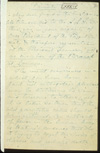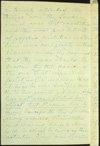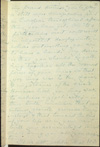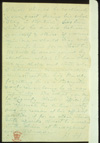Mahatma Letter No. 121
| Quick Facts | |
|---|---|
| People involved | |
| Written by: | Koot Hoomi |
| Received by: | A. P. Sinnett |
| Sent via: | unknown |
| Dates | |
| Written on: | January 1884 - see below |
| Received on: | February 7, 1884 |
| Other dates: | unknown |
| Places | |
| Sent from: | unknown |
| Received at: | London |
| Via: | unknown |
This is Letter No. 121 in The Mahatma Letters to A. P. Sinnett, 4th chronological edition. It corresponds to Letter No. 84 in Barker numbering. See below for Context and background.
< Prev letter chrono
Next letter chrono >
< Prev letter Barker
Next letter Barker >
Page 1 transcription, image, and notes
|
Private My dear friend — The enclosure is to be transmitted to the L.L.T.S. through you in your capacity of Vice-President of the Parent Society and therefore representative of the President Founder, not as member of the Branch at London. The recent occurrences in which you have borne a part not altogether pleasant, may be distressing to some and tiresome to others, yet it is better so than that the old paralytic calm should have continued. An outbreak of fever in the human body is nature's evidence that she is trying to expel the seeds of disease and perhaps death |
NOTES: |
Page 2
|
anteriorily absorbed. As things were, the London Branch was but vegetating and the vast possibilities of psychic evolution in Britain were completely untried. Karma evidently required that the repose should be broken by the agency of the one most responsible for it — C. C. Massey, and so it was he who brought Mrs. K. to her present position. She has not accomplished her object, but Karma has its own; henceforth the London group aroused, stimulated and warned, have a clear field in which to exercise their activities. Your own karma |
NOTES: |
Page 3
|
my friend, destines you to play a still more conspicuous part in European theosophical affairs than you have yet. Olcott's forthcoming visit will result in important developments, in whose out-working you are to have a hand. My desire is that you should be gathering together all the reserved forces of your being so that you may rise to the dignity and importance of the crisis. However little you may seem to achieve — psychically — in this birth, remember that your interior growth proceeds every instant, and that toward the end of your life as in your next birth your accumulated merit shall bring you all you aspire to. It is not politic that H. S. |
|
NOTES: |
Page 4
|
Olcott should be exclusively your guest during his whole stay in Britain; his time should be divided between yourself and others of various opinions — should they wish to invite him for a short time. He will be accompanied by Mohini, whom I have chosen as my chela and with whom I sometimes communicate directly. Treat the boy kindly, forgetting he is a Bengalee, and only remembering he is now my chela. Do what you can to dignify Olcott's office; for he represents the entire Society, and by reason of his official position, if for no other, stands with Upasika, closest to ourselves in the chain of Theosophical work. Assirvadam. |
|
NOTES:
|
Context and background
The affairs of the London Lodge were still in somewhat of a turmoil. As a matter of fact, the Mahachohan has advised postponement of the election. Apparently the two factions, led by Mrs. Kingsford and A. P. Sinnett, were more or less at loggerheads with each other. Events had not led to the "magnetic harmony" mentioned by the Mahatma in his former letter to the Lodge.
Physical description of letter
The original is in the British Library, Folio 3. George Linton and Virginia Hanson described the letter this way:
KH script in green ink, with heavy lettering on both sides of heavy-folded stationery.[1]
Publication history
Commentary about this letter
Notes
- ↑ George E. Linton and Virginia Hanson, eds., Readers Guide to The Mahatma Letters to A. P. Sinnett (Adyar, Chennai, India: Theosophical Publishing House, 1972), 191.



